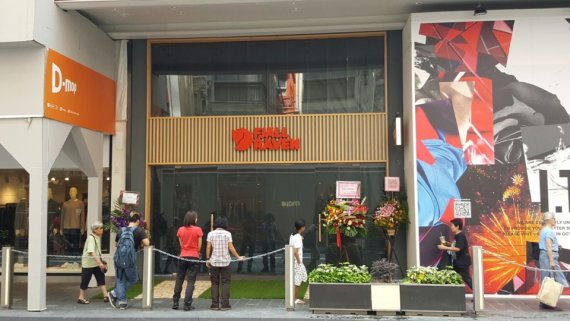
1. WeChat and Alipay: The Chinese are trendsetters
China is progressive, leading the way in technical developments and consumer behavior. "The Chinese have a good feel for trends and innovations," says Matthias Preussel, Sales Director Asia-Pacific at Lowa, for example. He is an absolute China expert and has also held similar positions at Mammut, Uhlsport and Head.
The Chinese are often ahead of the West when it comes to online trends, for example, says Preussel. For example, more than 90 percent of Chinese people use their cell phones to access the Internet and pay with them: The payment functions of the most important Chinese app WeChat or Alipay (payment system of the Internet group Alibaba) have made cash and cash cards almost superfluous for many Chinese.
2. info source no. 1: smartphones
Content on smartphones as the most important source of information is pushing magazines and journals out of the market. "Forget print," says Kössler, founder of the Market Introduction Program for China. There are still magazines, but investing in them is not worthwhile for the time being.
However, catalogs, workbooks and POS materials are still important. These "must be modified for China," advises Kössler: "They should have a more valuable appearance, because the Chinese value these materials very highly.
3. Chinese love European brands
Owning a brand is one of the biggest opportunities for European and North American companies. Western brands, especially European ones, are held in very high regard in China. "If a brand comes from Europe, that is an important seal of quality in China," says Martin Kössler, who was responsible for Haglöfs' market entry in Asia.
The most successful sports brands in China in pictures
Even though the appearance of brands should of course be adapted to the Chinese market, the (European) brand identity should therefore by no means fade into the background, advise Kössler and Preussel.
For example, Lowa clearly indicates where the brand comes from in display advertising in stores. Nevertheless, the shoe specialist in China tends to stand for casual outdoor because the topic is much more present in Asia. Classic mountain boots like those sold in Europe, on the other hand, hardly play a role in China.

4. marketing with stars is part of China
An actor promoting Lowa? What would be considered a misguided marketing measure here is an important part of the shoe specialist's communication policy in China. "The Chinese love their stars and actors," says Matthias Preussel. At Lowa, of course, there was still a long discussion about whether to actually sponsor actors, says the Sales Director Asia-Pacific.
In the meantime, Lowa equips around 100 actors, singers and bands - as well as social opinion leaders - in China. For China connoisseurs: Among the actors are Zhu Dan, for example, who reaches an audience of millions in China with martial arts, but also with romantic comedies, or Dou Xiao. The "Lowa star" can be seen in many romantic dramas and literary adaptations.
5. TV advertising for outdoor companies
Based on this experience, Preussel, like Kössler, advises people to throw their own convictions overboard. During his time at Mammut, they even ran TV commercials. This is not really an option for an outdoor brand in Europe, says Lowa man Preussel.
But in China, television was important for Mammut. That's why it's so essential to see for yourself on site, to get a feel for the habits.
6. use PR, advertising agency in China
Even if one's own knowledge of the Chinese market is good, this is never a substitute for an expert on site, says Kössler. Therefore - if available - use the own distributor or a marketing / PR agency on the spot. Trends are simply developing far too quickly in China. It is important to have trustworthy employees and business partners on site.
7. marketing with events...
...that's what Richard Öhman, owner and founder of Point 65º Kayaks Sweden, advises: "Especially for our niche product, small events make a lot of sense." Word of mouth is very valuable in China, he says. This is even more true for a small scene sport and that is why they always host test events.
If the testers include local influencers, for example, that is very helpful. Arc'Teryx also started this way with a local scene insider and is now the top outdoor and climbing brand in China with an incredibly good image.
8. marketing at the point of sale
Those setting up stores should commission materials locally. This has several advantages, Kössler explains. Among other things, there are no import fees and no customs inspections. Free-standing shelves should have a maximum height of 1 meter 40, since in many regions the Chinese are on average smaller than in Europe.
Sportbusiness in China
Brands also need to think about how they are perceived in China. Many outdoor brands are considered fashion brands in China. As a result, the ambience in the store should also be somewhat more dignified than in Europe. "There are many little things to consider here, which is why it makes sense to involve a local partner in store planning," says Kössler.
9. China is not one market, but many.
The country can be divided into many different regions in terms of climate, education level, income, population density, consumer behavior, and so on. It is important for companies to conduct their own differentiated market analysis and draw conclusions from it. Asia expert Preussler: "Preparation is essential. The Chinese market is very complex, which is another reason why market analyses never have general validity."
Everyone will make mistakes, but these are worthwhile, Preussler is convinced of that. Alex Koska, Vice President of the Fenix Group of Companies, has also noticed this. He is responsible for Global Sales and has been successfully represented on the Chinese market with Fjällräven for several years.
"Before entering the market, we thought for a while that we could occupy the bird watching and hunting sector in China," Koska tells us, "but we hadn't considered the fact that nobody watches birds in China and hunting is prohibited." This has not dampened the company's success, and Fjällräven now has 41 stores in China.
- Awards
- Mountain sports
- Bike
- Fitness
- Health
- ISPO Munich
- Running
- Brands
- Sustainability
- Olympia
- OutDoor
- Promotion
- Sports Business
- Textrends
- Triathlon
- Water sports
- Winter sports
- eSports
- SportsTech
- OutDoor by ISPO
- Heroes
- Transformation
- Sport Fashion
- Urban Culture
- Challenges of a CEO
- Trade fairs
- Sports
- Find the Balance
- Product reviews
- Newsletter Exclusive Area
- Magazine



































